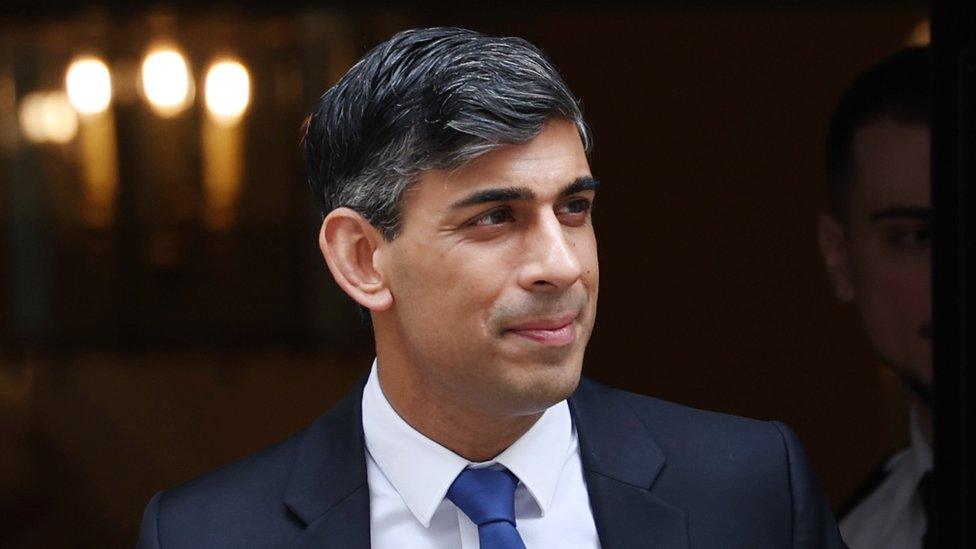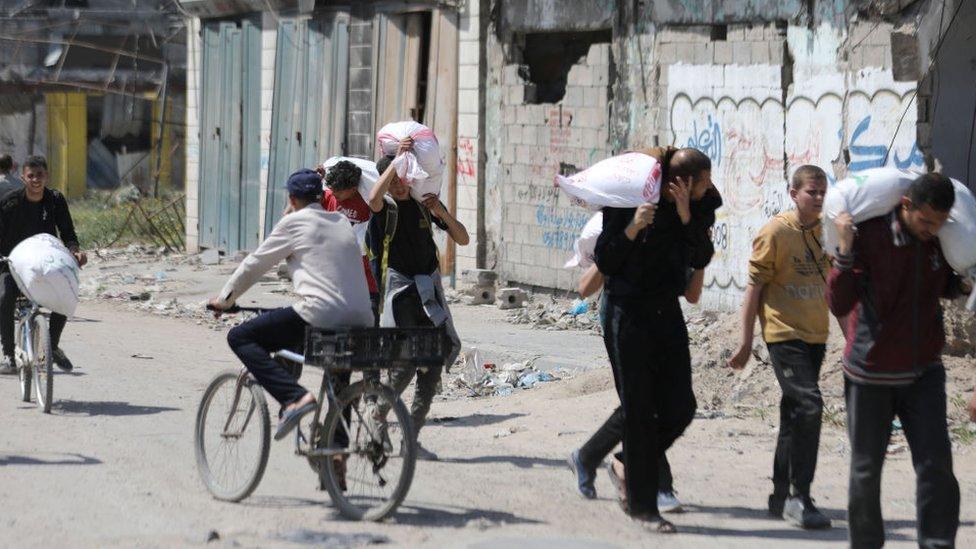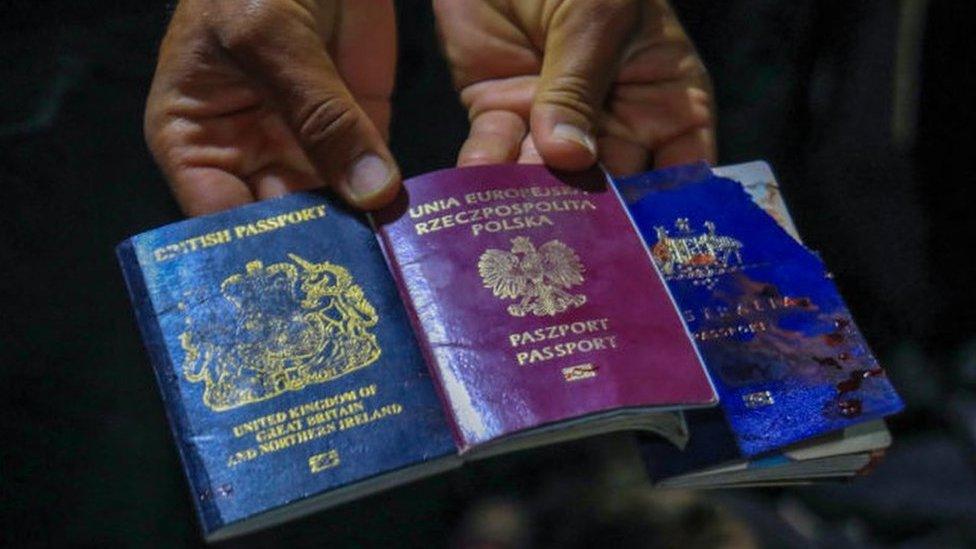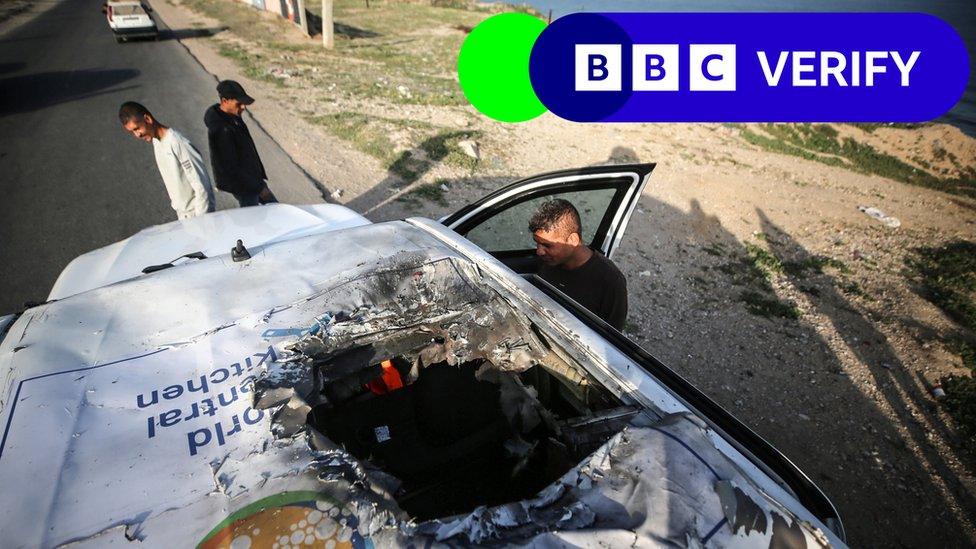Rishi Sunak facing pressure over UK arms sales to Israel
- Published

Rishi Sunak is facing growing pressure over UK arms sales to Israel, after the killing of seven aid workers by an Israeli strike in Gaza.
The Liberal Democrats, Scottish National Party (SNP) and a former UK national security adviser are calling for sales to be suspended now.
Labour says sales must stop if government lawyers believe Israel risks breaching international law.
The prime minister says the UK has a "very careful" arms licensing regime.
Speaking to the Sun, external, he called for an independent investigation into the Israeli strike, but stopped short of saying arms sales should end.
He added that the UK had been "consistently clear" with Israel that it must follow international humanitarian law.
Describing the deaths as "an awful tragedy," he said the UK wanted to see "a dramatic increase in the amount of aid getting into Gaza".
Britons John Chapman, James Henderson and James Kirby, who were all military veterans, were working alongside food aid charity World Central Kitchen as security and safety advisors when their convoy was attacked from the air on Monday.
The other individuals killed in the strike were aid workers Lalzawmi "Zomi" Frankcom, an Australian national, American-Canadian dual citizen Jacob Flickinger, Polish national Damian Sobol and Palestinian Saifeddin Issam Ayad Abutaha.
Israeli Prime Minister Benjamin Netanyahu described the attack as unintended and "tragic", promising an independent investigation.
Speaking to the BBC earlier, former national security advisor Lord Ricketts called for the UK to halt arms sales, saying it would send a "powerful message" and encourage a similar debate in the United States.
"I think there's abundant evidence now that Israel hasn't been taking enough care to fulfil its obligations on the safety of civilians," he told BBC Radio 4's Today programme.
Parliament recall demand
Sir Alan Duncan, an ex-Tory MP and former Foreign Office minister, has also joined calls for a suspension, writing in the Independent, external that further arms sales "cannot be justified".
Labour has not called for a suspension, but is urging the government to publish internal legal advice on whether Israel is in breach of international law.
"If it says there is a clear risk that UK arms might be used in a serious breach of international humanitarian law, it's time to suspend the sale of those arms," added shadow foreign secretary David Lammy.
He told reporters there was "precedent" for suspending sales. Former PMs Margaret Thatcher and Tony Blair both took the move, in 1982 and 2002 respectively.
The SNP is calling for Parliament to be recalled from its current Easter break, ending on 15 April, to debate whether arms sales to Israel should be stopped.
Conservative MP Paul Bristow said the idea British-made arms could be used in action that kills innocent civilians in Gaza "turns the stomach," adding the deaths of British aid workers "must be a line in the sand".
But his fellow Tory MP and former home secretary Suella Braverman rejected the idea of a ban, telling the BBC "we owe it to Israel to stand with them".
Speaking during a trip to Israel, she said: "I think that it would be a tragic shame if we were to walk away from our closest ally in this region".
She added that UK arms exports to Israel were "relatively small" and "the Israeli government will carry on with or without the provision of UK arms".
Watch: Video shows World Central Kitchen vehicles destroyed in Gaza air strike
Asked if he backed calls for arms sales to Israel to be suspended, the prime minister told the Sun: "We've always had a very careful export licensing regime that we adhere to. There are a set of rules regulations and procedures that we'll always follow.
"And I've been consistently clear with Prime Minister Netanyahu since the start of this conflict that whilst of course we defend Israel's right to defend itself and it's people against attacks from Hamas, they have to do that in accordance with humanitarian law, protect civilian lives, get more aid into Gaza."
Arms export licences, which are granted by the business department, cannot be issued if there is a clear risk the weapons could be used in a serious violation of international humanitarian law.
The UK has licenced arms to Israel worth over £574m since 2008, when official country-level data was made available, according to pressure group Campaign Against Arms Trade (CAAT).
Business Minister Greg Hands has previously told MPs the figure for 2022, £42m, represented 0.02% of Israel's military imports that year.
British sales are lower than those of other countries, including Germany and Italy, and dwarfed by the billions supplied by its largest arms supplier, the United States.
But a UK ban would nevertheless add diplomatic and political pressure on Israel, at a time when its conduct in the Gaza conflict is coming under renewed international scrutiny.
Last week, a cross-party group of more than 130 MPs and peers, external wrote to Foreign Secretary Lord Cameron calling for an immediate suspension of export licenses for arms sales to Israel.
Much of the Gaza Strip has been devastated during the Israeli military operations that began after Hamas gunmen attacked southern Israel on 7 October, killing about 1,200 people and seizing 253 hostages.
About 130 of the hostages remain in captivity, at least 34 of whom are presumed dead.
More than 32,916 people have been killed in Gaza since then, the Hamas-run health ministry says.
Related topics
- Published2 April 2024

- Published2 April 2024

- Published5 April 2024

- Published4 April 2024
